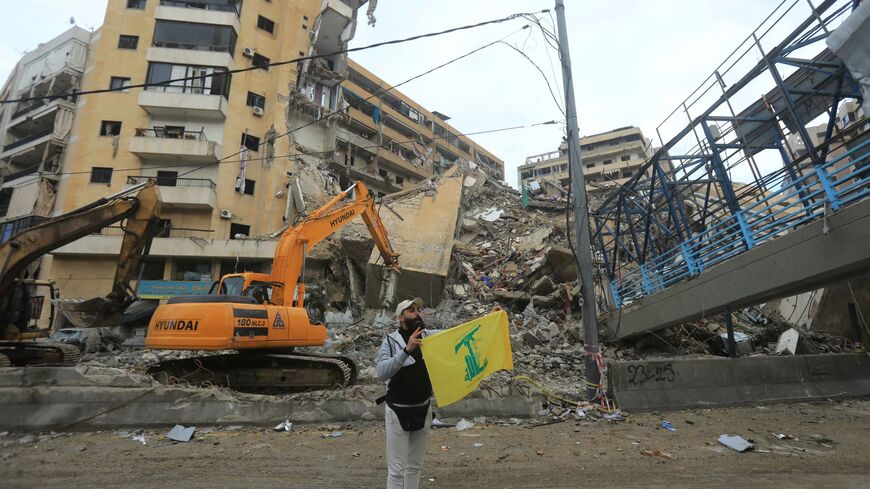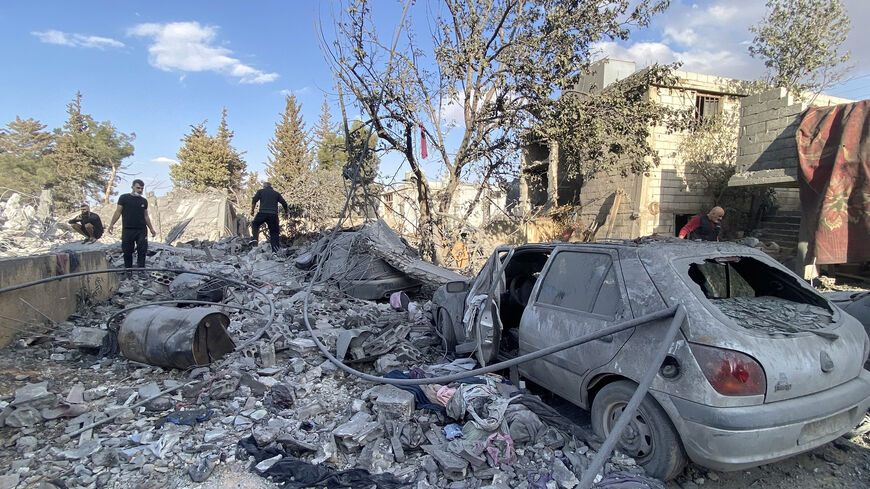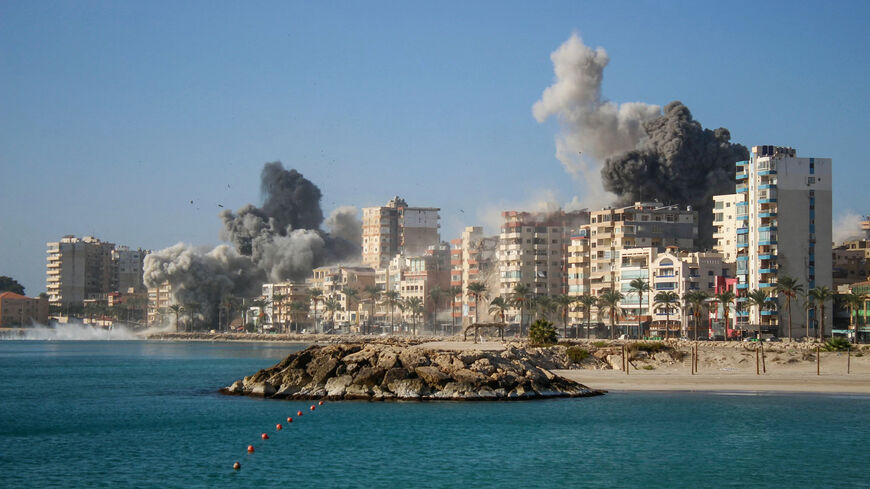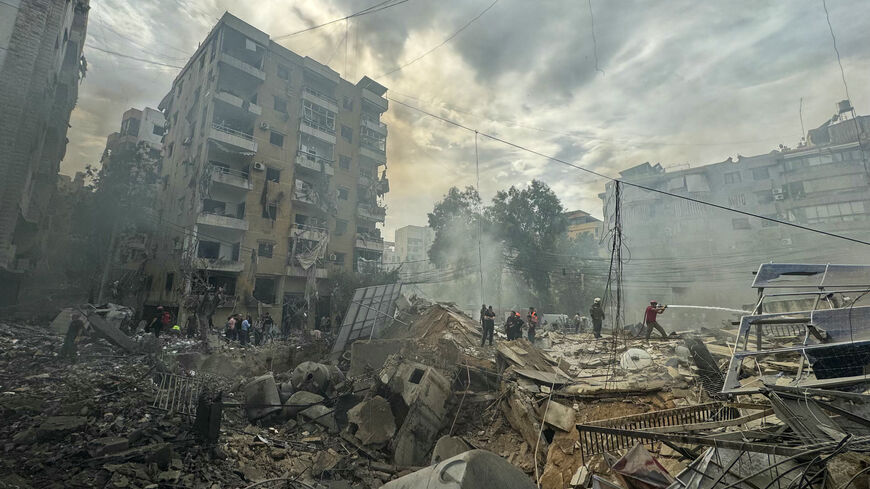At least 492 killed in Israeli strikes on south, east Lebanon
The Israeli army has been sending warnings to Lebanese citizens to distance themselves from areas where Hezbollah might be storing weapons, as it intensifies its airstrikes in the country.

BEIRUT — At least 492 people have been killed and more than 1,600 others injured in intense Israeli airstrikes in southern and eastern Lebanon on Monday, as Israel expands its strikes in the country after warning Lebanese citizens to move away from Hezbollah targets. The Lebanese Health Ministry said in a statement carried by the official National News Agency that several women, children and paramedics are among the casualties.
Israeli warplanes launched dozens of airstrikes across southern Lebanon on Monday, in the largest attack in months. Strikes in several towns and villages across the south, including in the districts of Sidon, Nabatieh and Tyre, were reported.
Check out Al-Monitor's live blog here.
Heavy traffic was reported on all roads leading from the south toward Beirut, as people are fleeing the areas of conflict. In a statement on Monday, Interior Minister Bassam al-Mawlawi ordered municipalities in some areas — including in the Bekaa Valley in the east, in Tripoli in the north and in Beirut and its surroundings — to open schools and turn them into shelters in order to receive the displaced.
مشاهد لموجة نزوح جديدة من القرى الجنوبية في #لبنان بعد أن كثفت #إسرائيل الضربات العسكرية عليها#قناة_العربية pic.twitter.com/SuWMYAqlBO
— العربية (@AlArabiya) September 23, 2024
Meanwhile, a missile fell in the Byblos (Jbeil) district in Mount Lebanon, more than 100 kilometers (62 miles) from the border with Israel, according to local media, for the first time since the Israel-Hezbollah fighting broke out last October. The missile fell in an uninhabited mountainous area between the towns of Almat and Ehmej, without casualties, the Lebanese National News Agency reported.
The source of the missile was not identified. But it came amid heavy Israeli airstrikes across southern Lebanon and in the east, from the northeastern town of Hermel, southward toward the valleys of Bouday, Shamstar and Wadi Umm Ali.
#عاجل محيط بحيرة وسد #القرعون في #البقاع الغربي pic.twitter.com/UoCWi57TjS
— Annahar النهار (@Annahar) September 23, 2024
Hezbollah, for its part, announced that it has launched dozens of rockets at various military sites in northern Israel, including the headquarters of the Northern Command reserve, the Galilee Division reserve base and its logistical warehouses at the Amiad base, as well as the Rafael military industries complexes in the Zvulun area north of Haifa.
Israeli warnings as escalation intensifies
The Israeli army said it was widening its strikes against Hezbollah targets inside Lebanon, adding that it struck more than 300 Hezbollah targets on Monday.
“The Israeli army will engage in more extensive and precise strikes against terror targets that have been embedded widely throughout Lebanon,” Israeli military spokesman Daniel Hagari said in a video statement Monday, adding that the attacks will begin “shortly.”
He further warned “civilians from Lebanese villages located in and next to buildings and areas used by Hezbollah for military purposes, such as those used to store weapons, to immediately move out of harm's way for their own safety.” Similarly, the Arabic-language spokesperson for the Israeli military — Avichay Adraee — said strikes on houses in Lebanon where Hezbollah is storing weapons are “imminent.”
غارات اسرائيلية تستهدف بلدة سحمر في البقاع الغربي pic.twitter.com/bHBA5mSTSj
— Al Jadeed News (@ALJADEEDNEWS) September 23, 2024
In a video statement on Monday, Netanyahu accused Hezbollah of using “local populations as human shields,” warning that “anyone who possesses a weapon in their home or is near locations or houses where Hezbollah has hidden its weapons should leave the area immediately."
Coinciding with the Israeli warnings, several Lebanese citizens, including caretaker Information Minister Ziad Makary, received phone calls from Lebanese landlines and text messages purportedly from the Israeli army, advising them to leave their locations immediately.
The escalation follows days of intense Israeli airstrikes in Lebanon as Israel seems to be pushing forward an operation against Hezbollah to allow the safe return of residents to the north.
مشاهد جديدة للغارات العنيفة التي شنها الجيش الإسرائيلي على #جنوب_لبنان #إرم_نيوز pic.twitter.com/5COaHKWDIq
— Erem News - إرم نيوز (@EremNews) September 23, 2024
The army stepped up its strikes after two back-to-back attacks last Tuesday and Wednesday, which saw thousands of pagers and hundreds of wireless radios used by Hezbollah members explode across Lebanon. The attacks left at least 37 people dead and nearly 3,000 others injured.
While Israel’s President Isaac Herzog denied his country’s involvement in the attacks, Hezbollah’s Secretary-General Hassan Nasrallah blamed Israel and vowed to respond “soon.”
Two days after the explosions of wireless devices, four Israeli strikes hit a building in a populated area of the southern suburbs of Beirut on Friday, killing at least 52 people and leaving 66 others injured, according to the Lebanese Civil Defense. Among the casualties was Ibrahim Akil, an elite commander in Hezbollah’s Radwan Unit, and several other members of the unit.
Speaking at Akil’s funeral in Dahiyeh on Sunday, Hezbollah's deputy chief Naim Qassem said his group has entered a “new phase” with Israel.
“We are prepared to confront all military possibilities,” he further vowed.
Around 60,000 Israelis have been evacuated from northern Israel since the cross-border hostilities with Hezbollah began on Oct. 8, 2023, according to Israeli media. In Lebanon, nearly 112,000 people have been displaced due to the fighting, according to the United Nations humanitarian agency OCHA.
The Iran-backed group says its fight against Israel is in solidarity with the Palestinian Hamas group, which has been engaged in a war with Israel in the Gaza Strip since Oct. 7, 2023. Hezbollah insists that its operation will not stop until the war in Gaza ends.
The border fighting has left more than 500 people dead in Lebanon, mostly Hezbollah fighters, according to local figures, while Israel reported the death of 26 civilians and 22 soldiers on the Israeli side.
French envoy in Lebanon
French presidential special envoy for Lebanon Jean-Yves Le Drian arrived in Beirut on Monday afternoon amid the ongoing Israeli airstrikes in the south and east of the country.
Le Drian is expected to meet with Lebanese officials and military chief Gen. Joseph Aoun to discuss the latest security developments.
This developing story has been updated since initial publication.






